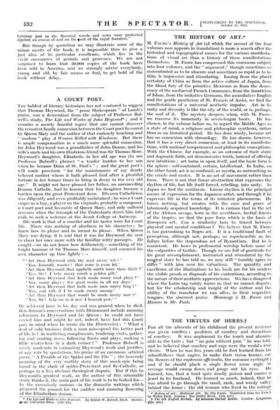A COURT POET.
THE boldest of literary historians has not ventured to suggest that Thomas Heywood, the " prose Shakespeare " of Lamb's praise, was a descendant from the subject of Professor Bol- well's study, The Life and Works of John Heywood* ; and it remains a merely fanciful regret that one cannot discover the remotest family connexion between the Court poet favoured by Queen Mary and the author of that curiously touching and " modern " play A Woman Killed with Kindness. But there is ample compensation in a much more splendid connexion, for John Heywood was a grandfather of John Donne, and his wife's uncle and his own illustrious friend was Sir Thomas More. Heywood's daughter, Elizabeth, in her old age was (to use Professor Bolwell's phrase) " a tender burden to her son when he became Dean of St. Paul's " ; and the great poet's will made provision " for the maintenance of my dearly beloved mother whom it hath pleased God after a plentiful fortune in her former times to bring in decay in her very old age." It might not have pleased her father, an uneonceding Roman Catholic, had he known that his daughter became a burden upon the great Protestant dean. His own Catholicism was diligently and even profitably maintained ; he was a Court singer as a boy, a player on the virginals, probably a composer, a Court poet and favourite of Queen Mary, and only suffered reverses when the triumph of the Protestants drove him into exile to seek a welcome at the Jesuit College at Antwerp.
His work is that of a courtier and his tastes were for _Court life. There was nothing of aloofness in his character ; he knew how to please and he meant to please. When Queen Mary was dying, it is said that it was for Heywood she sent to cheer her once more with the familiar witty passages. He caught—we do not know how deliberately—something of the bright humour of Sir Thoinas Morc himself, and summed his own character up thus lightly :- " ' Art thou Heywood with the mad merry wit 1'
Yea, forsooth, master ! that same is even hit.'
' Art thou Heywood that applieth mirth more than thrift ?'
' Yea, Sir ! I take merry mirth a golden gift.'
`Art thou Heywood that bath made many mad plays ? '
' Yea, many plays ; few good works in all my days.'
`Art thou Heywood that hath made men merry long 1'
Yea, and will, if I be made merry among.'
' Art thou Heywood that would be made merry now ' ' Yea, Sir ! help me to it now I beseech yow.' "
He achieved fame in his day and was praised when he died; Ben Jonson's conversations with Drummond include amusing references to Heywood and his Queen ; he could not have envied him and might he not, indeed, have had this Court poet in mind when he wrote (in the Discoveries) : ." What a deal of cold business doth a man miss-spend the better part of life in I in scattering compliments, tendering visits, gather- ing and venting news, following feasts and plays, making a little winter-love in a dark corner ? " Professor Bolwell is wisely moderate in estimating Heywood's work and justifies, at any rate by quotations, his praise of an enormous satirical poem, " A Parable of the Spider and the File " ; the heavenly meaning of the very earthly story of this mock-epic being found in the clash of spider-Protestant and fly-Catholic, or perhaps in a leSs obVious theological dispute. But if this be Heywood's greatest work, as the author of this admirable study thinks it, the main part of his work is to be looked for— by the excessively curious—in the dramatic writings which prepared the ground for the sudden and amazing flowering of the Elizabethan drama.
• The Life and Works of John Heywood. 15 Robert W. Dolwell, Ph.D. Oxford : It the university Press. Mrs, 611


































































 Previous page
Previous page